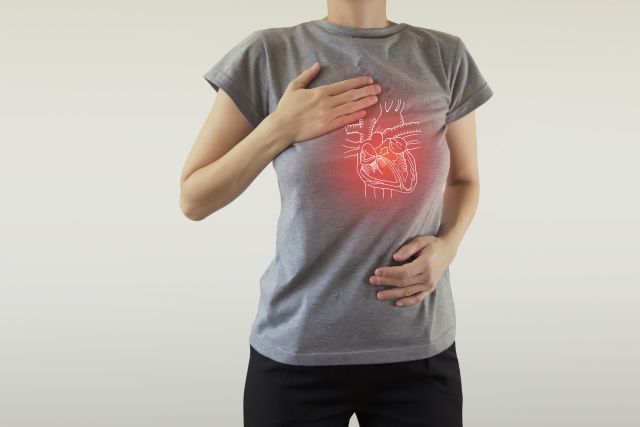The heart is a four-chambered, muscular organ that pumps blood carrying oxygen and nutrients to the body and transports blood to the lungs to exchange carbon dioxide for fresh oxygen. The two top chambers are atria; the two bottom chambers are ventricles. Valves keep blood flowing in the right direction, between the chambers and into vessels leading out of the heart. Valves open and close once during each heartbeat.
The names of the four valves are mitral, tricuspid, aortic, and pulmonic. Heart valve disease occurs when one or more these heart valves do not work normally.
A person can be born with heart valve problems or acquire them later in life, especially as they age. Congenital heart valve disease refers to heart valve disease that occurs during development before birth. Acquired heart valve disease refers to heart valve disease that is acquired later in life, and can be the result of infections, heart disease, heart attacks, or damage to the heart.
Types of heart valve disease
There are three main types of heart valve disease:
- Regurgitation. Regurgitation (also called backflow, or an insufficient or “leaky” valve) occurs if a valve does not close properly, allowing blood to leak back into the chamber it just left. This can occur when a valve does not close tightly enough, or when a valve prolapses or bulges back into the heart chamber during the heartbeat. It can be either congenital or acquired.
- Stenosis. With stenosis, the valve becomes narrowed, which reduces blood flow. This can occur when a valve becomes thickened, stiff, or fused together so it can't fully open. It can be either congenital or acquired.
- Atresia. Atresia is an example of congenital heart valve disease, and occurs when a valve lacks an opening for the blood to pass through.
Healthcare providers refer to heart valve disease by pairing the name of the valve with the type of problem. For example, aortic regurgitation occurs when blood backflows from the aortic valve, and mitral stenosis occurs when the mitral valve becomes narrowed.
Symptoms of heart valve disease
Some people have minor heart valve disease with few, if any, symptoms. Others have noticeable symptoms. The onset of symptoms can be gradual or occur very swiftly. Symptoms can include:
- Unusual fatigue
- Dizziness, lightheadedness, or fainting
- Shortness of breath, especially when lying down or during exertion
- Swelling in the ankles, feet, legs, or abdomen
- Chest pain
- Fluttering, racing, or irregular heartbeat
If you are experiencing any of these symptoms, it is important that you work with a healthcare provider to identify and address the cause. There are a number of treatments available for heart valve disease. Treatment will depend on a number of factors, including the type of heart valve disease you have, your symptoms, your age, and your medical history.
For some patients, the only treatment needed may be monitoring and taking steps to protect the heart from damage and disease, such as eating a heart healthy diet, exercising, and eliminating unhealthy habits like smoking. Medications may be needed to manage symptoms and heart disease. Faulty valves can also be replaced or repaired with surgery.
Medically reviewed in August 2019.





